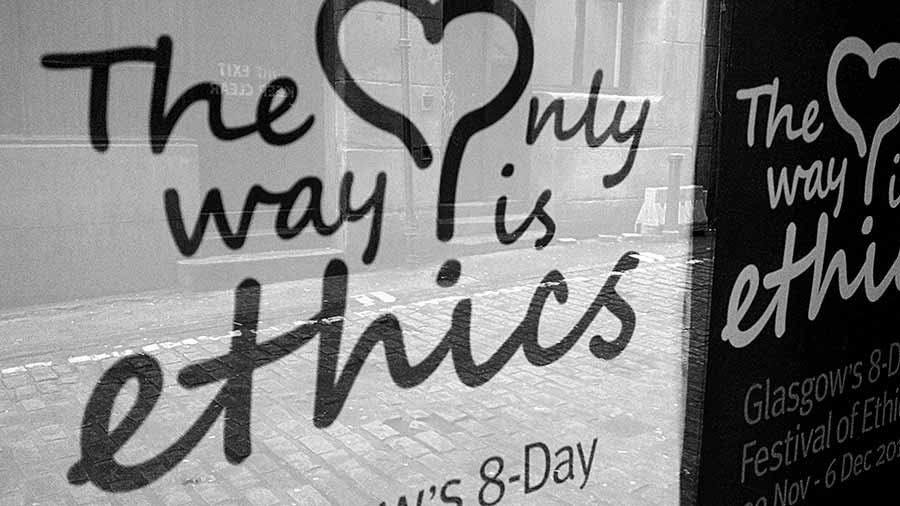
The Only Way is Ethics, an 8-day festival in Glasgow, Scotland, in 2015. Creative Commons Attribution-ShareAlike 4.0 International Licence
The “ethically mediocre” should be encouraged as more consumers look for “just” businesses, a festival has heard.
“Decent behaviour” allowed great contributions to society, argued Professor Hugh McLachlan of Glasgow Caledonian University1 at a panel of ethically driven businesses.
The event was part of the annual “The Only Way Is Ethics” festival,2 held for the first time in Glasgow, and new and established businesses emphasised benefits as social enterprises, charities or limited companies to controlling their principles.
Prof McLachlan, of the school of business and society, said: “I don’t think we should disparage the average, the mediocre. We should applaud the ethically superlative, which I do.
“Sometimes, although businesses have moral responsibilities, there are limits to them. The morally superlative is great, but we can’t be all the time.
“The morally just, even if it’s just just, is acceptable. In terms of how we should react to businesses in general, on the one hand we might think it would be really great if businesses became better people – and of course that would be great.
“The trick is to try to get rules and laws such that good people are encouraged in goodness and bad people are discouraged in their badness. And if you can get laws, rules, legal context, such that the short-term interests of business to act in a way that is in the long-term interests of everyone.
“Think of it not as making better bankers but better rules for bankers.”
Prof McLachlan said business could provide wealth that could bring “good things”, such as philanthropy, and “decent behaviour” was enough to allow “superlative activities”.
He added: “Superb moral behaviour is great, but we shouldn’t disparage the economically morally mediocre but acceptably mediocre.”
But Greg Chauvet, who moved from working in IT and the financial sector into setting up The Bike Station in Glasgow, warned that he learned “the business world out there is 90 per cent bad”.
Mr Chauvet, whose was recognised recently as social entrepreneur of the year,3 said: “My aim in life changed. I want to show that the social enterprise sector can be successful and I believe in ethical business as much as possible. We can make the change.”
Annette Currie, who is setting up food van firm Food In The Hood,4 said it was a challenge to get started.
“I wouldn’t say we’re actually a business yet because we haven’t made a profit yet,” she said. “I haven’t even managed to pay myself minimum wage. But the intention was always that it couldn’t just be about making money because that’s just not me. There always had to be some other benefit, whether to try to use as much local produce to support local producers or going into low income areas.”
She set up as a limited company, not a social enterprise, to avoid government restrictions and be able to change directions if needed. “My intensions are good,” she added.
Textile and manufacturing firm BeYonder Ltd,5 which emphasises “profit for purpose” and pays above the living wage, also took that approach. Chrissy Mackay, a member of the panel discussion, said it was important to look at the good companies might be doing as well as the bad.
She said: “This is going to take time and years to change. They are making some of those changes – some smaller, some bigger than others. But we have to encourage that level of change and look at the good things that they’re doing and focus on that, instead of constantly berating people for the bad things that they do all the time. Even if it’s a just small change, encourage that in them.”
Her colleague David Scott said it was down to consumers to make choices, some of whom were limited by income, geography or the businesses available on the products or services they support.
He added: “At some future point we may be able to tip the scales and have consumers beat a path to our door. Until then though, it’s requiring that the leadership of business owners to just go out there, to take the chance, to be prepared to lose everything by picking the wrong thing to make or finding their way into niche markets to survive long enough to get this movement going.
“We don’t have a Scottish ethical business association that I’m aware of. Your own experience in not being able to find other ethical businesses suggest we really are the forefront of something – that’s quite an exciting place to be.”
- Prof Hugh McLachlan profile page. ↩
- Festival website. ↩
- Newspaper-organised Herald Society Awards 2015. ↩
- A profile page for the service. ↩
- Business website. ↩

